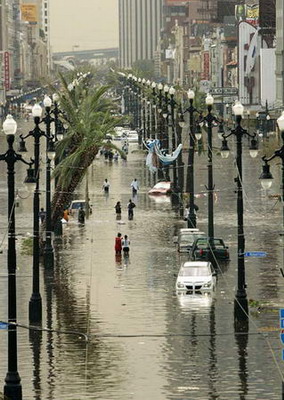
Streets are
flooded in New Orleans on August 30.-Xinhua
Hurricane Katrina on Monday slammed the Gulf Coast and the US government has
declared major disasters in these areas.
Officials reported at least 55 deaths, with 50 alone in Harrison County,
Miss., which includes Gulfport and Biloxi, according to the reports of New York
Times.
Emergency workers feared that they would find more dead among people believed
to be trapped underwater and in collapsed buildings.
The winds at that point were 233 km/h.
New Orleans, a bowl-shaped city that sits below sea level and has long feared
catastrophic damage from a massive hurricane, took a powerful blow from Katrina.
But it may have been spared the worst when the storm turned at the last
moment, sending its powerful wall of water toward Mississippi.
Some 200 people were stranded on rooftops in one neighborhood and several
"bodies are floating in the water," New Orleans mayor Ray Nagin -- who ordered a
mandatory evacuation of the city Sunday -- was quoted as saying by WWLTV.
An untold number of people were feared dead in flooded neighborhoods, many of
which could not be reached by rescuers because of high water.
"Some of them, it was their last night on Earth," Terry Ebbert, chief of
homeland security for New Orleans, said of people who ignored orders to evacuate
the city of 480,000 over the weekend. "That's a hard way to learn a lesson."
In Alabama, Louisiana and Mississippi, the governors declared search and
rescue their top priority, but said that high waters and strong winds were
keeping them from that task, particularly in the hardest-hit areas.
"We pray that the loss of life is very limited, but we fear that is not the
case," Louisiana Gov. Kathleen Blanco said.
At least two oil rigs were adrift in the Gulf of Mexico, where Katrina raged
through key offshore oil and gas fields as one of the strongest hurricanes on
record.
Oil prices had rocketed over a new high of 70 dollars a barrel, but prices
later dropped to 67.20 dollars in New York after the US government said it could
release strategic crude reserves.
Katrina, which hit the coast as a Category 4 storm on the five-stage
Saffir-Simpson hurricane scale, could become the most expensive storm in US
history, costing insurers up to $26 billion, risk analysts said.
White House spokesman Scott McClellan told media that US President George W.
Bush approved the major disaster declarations aboard Air Force One en route to
Arizona, paving the way for the use of federal money to help respond to the
hurricane.



